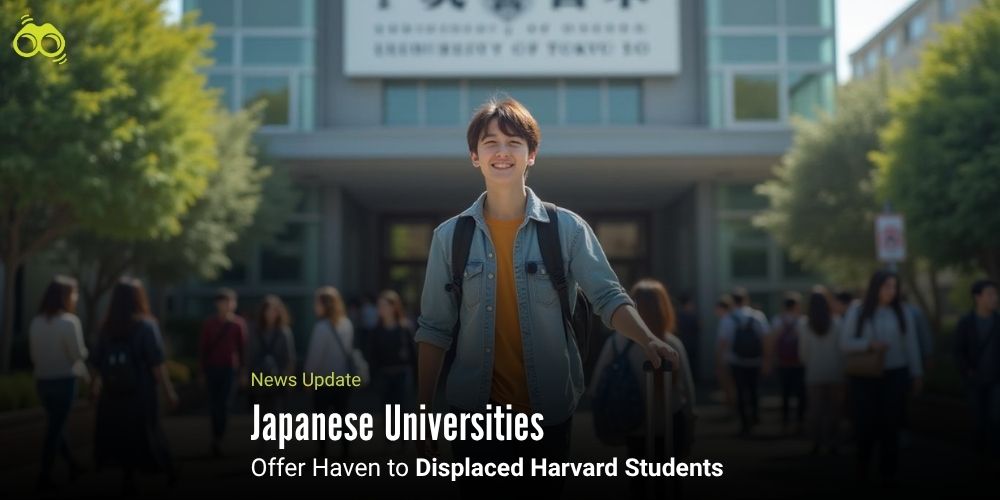Japan Responds to U.S. Policy by Offering Support to Affected International Students
University of Tokyo and Kyoto University Consider Enrolling Harvard’s Displaced Students
The U.S. government's decision to bar foreign students from Harvard University has sparked concerns over the future of international education and academic mobility. This policy shift not only disrupts the aspirations of affected students but also reflects a broader change in the U.S. approach to higher education accessibility. In response, other countries are stepping forward to offer alternative opportunities, ensuring that talented students can continue their studies without undue barriers.
Recognising the significance of this issue, the Japanese government has urged domestic universities to consider temporarily accepting students enrolled at U.S. institutions. This recommendation follows the University of Tokyo’s announcement that it is exploring options to accommodate international students from Harvard who may be affected by these policies. Demonstrating its commitment to global academic exchange, Japan is offering support to students facing uncertainty. Additionally, Hong Kong has also expressed willingness to welcome displaced international students, further reinforcing the global effort to uphold educational inclusivity.
According to The Asahi Shimbun on 26 May, the University of Tokyo (Todai) reiterated its dedication to ensuring that young, talented students can continue their education without interruption. The university referenced its 2022 initiative when it accepted approximately 20 students displaced by Russia’s invasion of Ukraine, allowing them to attend classes as auditors. A similar arrangement is expected to be implemented for Harvard’s international students, enabling them to continue their studies in Japan if necessary.
Reports indicate that international students from Harvard who are accepted by the University of Tokyo will be permitted to attend select classes and receive certificates of completion, allowing them to claim academic credit upon their return to Harvard or when enrolling elsewhere. In addition, Kyoto University announced that it is also considering admitting international students and young researchers from Harvard. The university stated it is closely monitoring the situation in the U.S. and is carefully assessing how best to support affected students.
Meanwhile, the Japanese education ministry has confirmed that the Japan Student Services Organisation will publish each university’s stance on assisting affected students. Education Minister Toshiko Abe affirmed that the government will collaborate with relevant institutions to ensure that talented young people can continue their education. This response follows the Trump administration’s move to revoke Harvard’s certification for the Student and Exchange Visitor Program, which would bar new foreign students and force current ones to transfer or lose their legal status.
At present, international students remain enrolled at Harvard due to a temporary injunction issued by a U.S. federal court while the administration’s decision undergoes review. The education ministry also reported that 110 Japanese students and 150 researchers are currently affiliated with Harvard and announced plans to provide a consultation service via the Japan Student Services Organisation’s website for students in the U.S.As countries work to safeguard academic mobility, the situation highlights the growing importance of international collaboration in education.
Editor’s Note:
The U.S. government's decision to bar foreign students from Harvard University is a troubling development that threatens academic diversity and intellectual exchange. Universities thrive on global perspectives, and restricting student mobility undermines the very principles of higher education. Instead of fostering collaboration and inclusivity, this move sends a message that politics is taking precedence over learning. Harvard, like many leading institutions, has long benefited from the contributions of international students, whose research, ideas, and perspectives shape the academic landscape. The response from international universities like the University of Tokyo and Kyoto University underscores the importance of academic inclusivity and global cooperation by offering displaced students alternative study options. Such initiatives help ensure higher education remains accessible despite geopolitical challenges. However, continued restrictions on international students could harm U.S. universities’ global appeal, diversity, and academic standing, potentially leading to lower rankings, reduced funding, and fewer collaborations.
According to Skoobuzz, to maintain excellence, universities and policymakers must prioritise openness and accessibility, keeping education a driver of progress rather than a victim of politics.














0 Comments (Please Login To Continue)